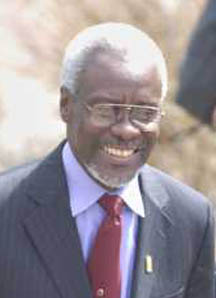(Jamaica Observer) Former Prime Minister P J Patterson on Tuesday prescribed a ‘seismic shift’ in Jamaica’s political culture to motivate the nation over the next 50 years of Independence.

He said that the country must abandon the adversarial political approach of the past, and replace it with a system of competitive politics, in which contention for office is designed to promote the most exacting consideration of policies and prompt acceptance of the best ideas, regardless of the origin.
“A sober reflection will reveal that we have been most successful whenever consensus and collaboration exist,” Patterson said, using as an example the creation of the Electoral Commission of Jamaica through cooperation between the two major political parties in the late 1970s.
Patterson was responding to more than two hours of tributes from 10 of his colleagues, including Prime Minister Portia Simpson Miller and Opposition Leader Andrew Holness in Gordon House, honouring his contribution to the Parliament’s first 50 years.
The special joint sitting of both Houses to honour him followed a similar event on October 9 to honour his colleague Edward Seaga, who served as prime minister from 1980 to 1989. Patterson served as Prime Minister from 1992 to 2005, winning three successive general elections in the process.
Dressed in a dark suit and yellow tie, the former prime minister sat with son Richard, and Seaga, who were among the special guests at the event attended by a large number of former parliamentarians, custodes, councillors, civil servants and diplomats.
In an unusual development, a huge television screen was set up in a small park across from Gordon House, where the proceedings were watched by some People’s National Party supporters unable to get inside the building.
Water lock-off by the National Water Commission placed undue strain on the utilities at Gordon House, and the Jamaica Fire Brigade had to provide two truckloads of water to fill two 600-gallon tanks which ran out close to the end of the sitting.
But the crowd inside the chamber and in the gallery did not seem too perturbed by the inconvenience and had to be cautioned by Patterson against participating in the applause, which is not allowed in the gallery during sittings of either House of Parliament.
Patterson, also warned his former parliamentary colleagues about what he described as opening themselves up to unnecessary abuse.
“It seems as if it’s always the open hunting season on politicians, and we must happily expect abuse for the things we have failed to complete, while also accepting that whatever our successes may be — great or small — neither recognition nor praise is due,” he stated.
However, he chided the parliamentarians for contributing to the perception, “by our uttering both here and on political platforms”.
He urged them to replicate the friendship that exists between them inside Gordon House in debates and in the public media, and to make “positive comments” about each other to defuse inevitable results such as “the widely held perception that politics is dirty (and) all politicians are corrupt and seeking to acquire power only for its own sake or self-aggrandisement.
“If we fail to foster a political environment which encourages, rather than discourages, our brightest minds and most proficient citizens from participating in the political process, we place our precious democracy at risk,” Patterson warned.
